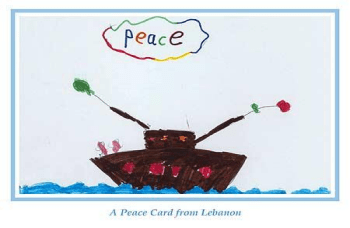By Talar Haidostian
“My soul glorifies the Lord and my spirit rejoices in God my Savior, for he has been mindful of the humble state of his servant. From now on all generations will call me blessed, for the Mighty One has done great things for me—holy is his name.”
Luke 1:46-55 New International Version
December 22, 2024
In 2005, at the age of six, on the occasion of the 60th anniversary of the end of World War II, I was selected to be one of the 20 students from all over Lebanon to draw an image of peace that would be shared around the country. One of the main objectives of the initiative was to allow Lebanese children to express their determination to keep their country away from political violence and war and to invite world leaders to resolve crises through peaceful means. I drew a warship that launched flowers and balloons. My vision was simple and playful, yet, as years passed by, I realized the complexity and the impossibility of that vision.
As I write this devotion 20 years after drawing that postcard, I cannot count the number of casualties, the types of conflicts, and the different dimensions of humanitarian crises imposed upon the Middle East. A region considered to be the cradle of civilization, the people there have endured so much violence and prolonged unrest that I fear, over time, most have come to see the unfortunate conditions as normal. The region, however, should be understood as more than a chapter in a history textbook, more than a story on the news, and more than just a series of conflicts. Instead, the Middle East provides the reason for my existence and my identity and includes my birthplace Lebanon.
From a young age, life in Lebanon taught me to be prepared for the possibility of a major or a minor war at any moment. And in some cases, that possibility became a reality. As I grew older, the uncertainty of life and the apathy from the international audience became a burden difficult to carry. I was disturbed by the impunity some countries enjoyed and felt discouraged by the neglect of the “human” in human rights during the many peace talks and negotiations. As a witness to the many contemporary conflicts in Lebanon, I realized in times of war, millions of people are left behind, and they are the ones who suffer and bear the most devastating consequences.
So what is the solution to achieving peace in the Middle East? It’s a question many have asked me, especially during my public policy studies in the United States. I would earn a Nobel Peace Prize if I had the answer. But I do know that light finds its life and purpose in darkness, and that courage is achieved through the grace for others, a grace which sustains us in faith.
I experience courage when those in need still open their doors to the displaced, or when a group of university students cooks and distributes food for hundreds, or a group of teenagers organizes entertainment for refugee children, or when a group of Red Cross volunteers transports injured people to hospitals, or simply when one witnesses the will to choose the good even when everything around seems evil.
Hebrews 4:16 says, “Let us then with confidence draw near to the throne of grace, that we may receive mercy and find grace to help in time of need.”
Conflicts may never end, narratives evolve, opinions shift, policies fluctuate, and political trends and priorities change over time. However, the grace of God is constant. May we experience God’s empathy for us, so we can in turn, have empathy for others. As we actively wait for the second coming of Jesus, let us come together, as Christ intended, to serve others in humility and compassion so that through grace, we can find courage in these challenging times.
Talar Haidostian is an Armenian, born and raised in Beirut, Lebanon, worked in Armenia, and studied in the United States of America. Her passions center around analyzing human, cultural, religious, and international factors and trends that influence community development. She currently works as the Operations and Program Coordinator at 21Wilberforce.
Reprinted from Churches for Middle East Peace cmep.org

